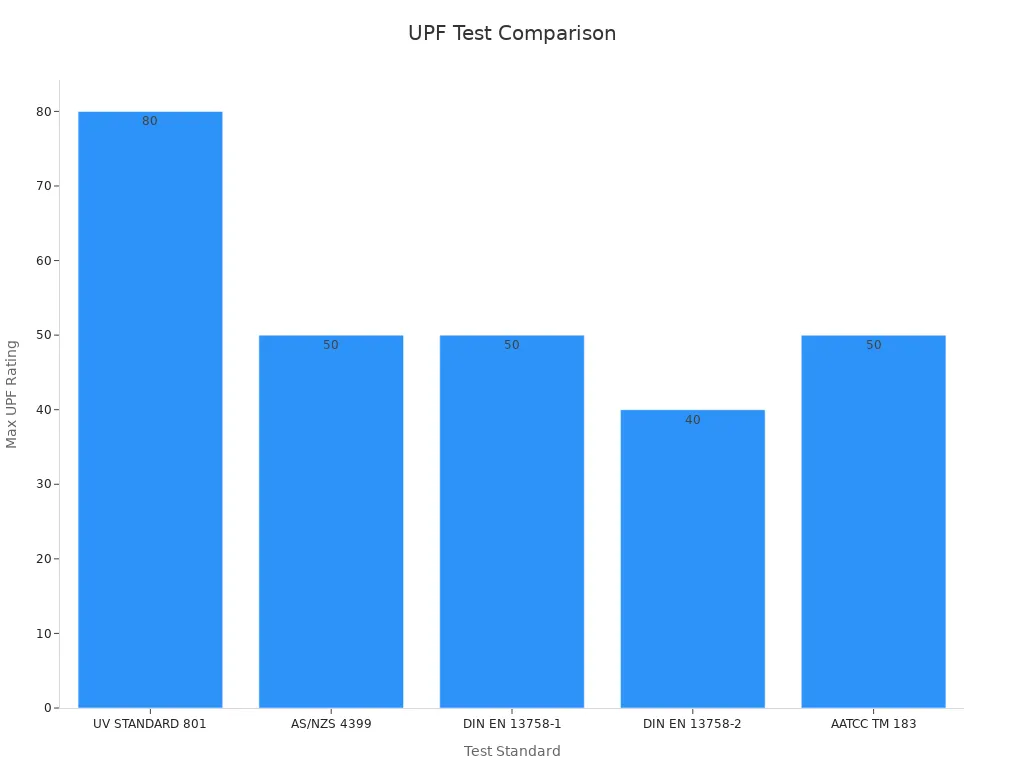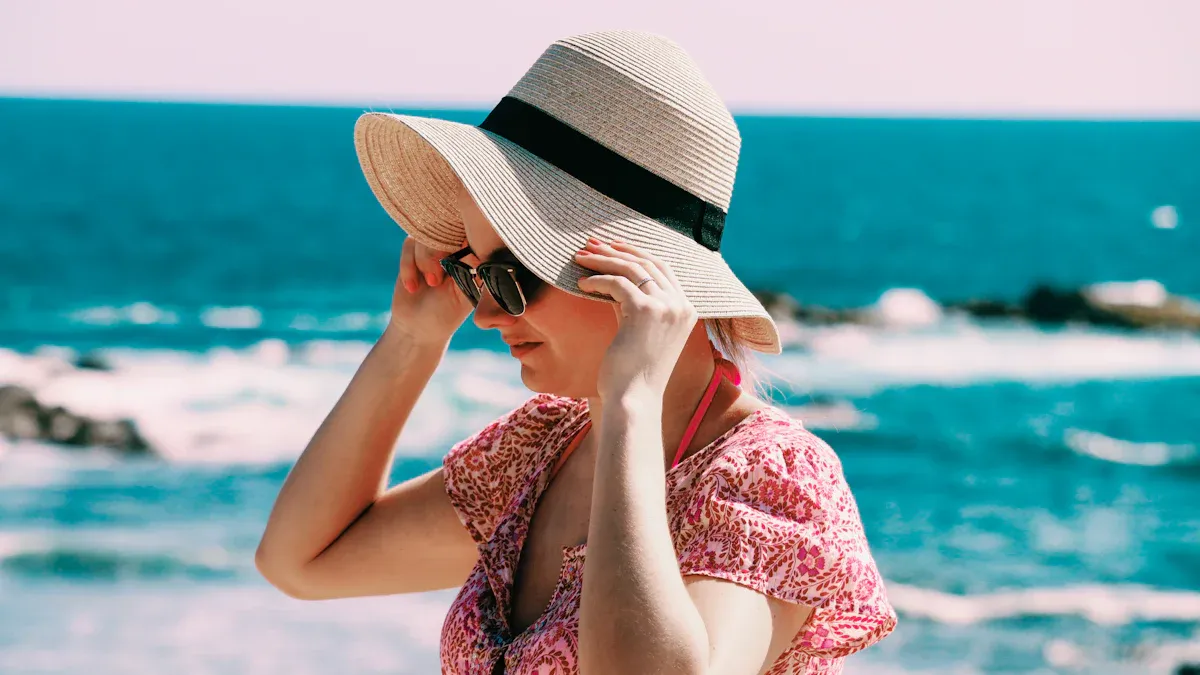How to Choose the Best Sun-Protective Clothing - The Ultimate Guide

You want the best sun-protective clothing for strong sun protection. Look for a high UPF rating, tightly woven or treated fabrics, and full coverage that feels comfortable. The table below shows that high UPF fabrics block up to 98% of UV rays. These features help protect your skin every day.
Aspect | Details |
|---|---|
UPF Effectiveness | High UPF (50+) blocks up to 98% of UV rays |
Comfort | Advanced fabrics stay breathable and resist water |
Key Takeaways
Pick sun-protective clothing with a high UPF rating of 40 or more. This helps block most harmful UV rays. It keeps your skin safe.
Find tightly woven, dark, or specially treated fabrics like polyester or nylon. These fabrics give strong sun protection and feel comfortable.
Choose loose sun shirts and hoodies that cover your arms, neck, and chest. Make sure they have moisture-wicking and breathable features. This helps you stay cool and dry.
What Is Sun-Protective Clothing
Why It Matters
You are in the sun every day, even if you do not see it. Sun-protective clothing helps keep your skin safe from uv radiation. This can lower your chance of getting skin cancer from too much sun. Some people think sunscreen is enough, but special clothes give you extra protection.
Everyone needs to be careful in the sun, especially if you go outside a lot. Sun-protective clothing stops both UVA and UVB rays. These rays can cause skin cancer and make your skin age faster. You can keep your skin safe by wearing the right clothes, not just by putting on sunscreen.
How It Works
Sun-protective clothing uses special fabric and ways of making it to block uv rays. These clothes have tightly woven fibers, dark or bright colors, and sometimes special chemicals to help block the sun. The UPF rating shows how much uv radiation the fabric stops. For example, a UPF 50 shirt only lets 1 out of 50 parts of uv rays reach your skin.
Sun-protective clothes are often made from polyester, nylon, or bamboo blends.
Dark denim, wool, and shiny polyester blends protect well from the sun.
Loose clothes cover more skin and do not stretch, so they keep you safer.
Wet or old clothes do not block uv rays as well.
You can count on sun-protective clothing to keep you safe from the sun. These clothes help stop skin cancer and are a good part of your sun safety plan.
Key Features of the Best Sun-Protective Clothing

UPF Ratings Explained
When you look for the best sun-protective clothing, always check the UPF rating. UPF stands for Ultraviolet Protection Factor. This number tells you how much UV radiation the fabric blocks. For example, a UPF 50 rating means the fabric lets only 2% of UV rays reach your skin. You get 98% protection from harmful rays. The Skin Cancer Foundation confirms that UPF 50+ fabrics block at least 98% of UV rays. This level of protection is important for anyone who spends time outdoors.
You should choose upf clothing with a high upf rating. Scientific research shows that the UPF rating measures how well a fabric prevents sunburn. Testing uses strict standards, so you can trust the label. Untested or untreated clothes may look protective but often fail to block enough UV rays. Always look for certified upf clothing to make sure you get real protection.
Tip: Pick sun shirts, sun hoodies, and long-sleeve sun shirts with a UPF of 40 or higher for the best results.
Fabrics and Weave
The fabric and weave of your sun-protective clothing matter a lot. Tightly woven fabrics like polyester and nylon give you better protection than loose weaves. Polyester is popular for sun shirts and sun hoodies because it blocks UV rays well and lasts longer outdoors. Nylon also works well, especially when treated with special coatings. Market research shows that polyester is more cost-effective and keeps its strength longer than nylon in the sun.
Fabric Type | UV Protection | Durability | Comfort Features |
|---|---|---|---|
Polyester | Excellent | High | Breathable, moisture-wicking, stain-resistant |
Nylon | Very Good | Moderate | Breathable, moisture-wicking, flexible |
Treated Blends | Superior | High | Breathable, moisture-wicking, stain-repellent |
You should look for sun shirts and sun hoodies made from these materials. Advanced treatments like nano-coatings and special finishes make the fabric even more protective and durable. Darker colors absorb more UV rays, so they protect better than light colors. If you want the best sun-protective clothing, pick items made from tightly woven, dark, or treated fabrics.
Note: Wet, stretched, or old fabrics lose their ability to block UV rays. Always check your sun shirts and long-sleeve sun shirts for wear and tear.
Fit and Coverage
Fit and coverage play a big role in how well your upf clothing works. Loose-fitting sun hoodies and long-sleeve sun shirts cover more skin and do not stretch as much. This keeps the fabric dense and blocks more UV rays. A long-sleeved shirt gives you more coverage than a short-sleeved one. You should choose sun shirts and sun hoodies that cover your arms, neck, and chest.
Field studies show that students who wore more covering upf clothing had better sun protection. Schools that encouraged hats and long-sleeve sun shirts saw fewer sunburns. The best sun-protective clothing covers as much skin as possible without making you too hot. Layering upf clothing can also boost your protection.
Try wearing a thin upf-50 shirt under your best sun hoodies for extra coverage on very sunny days.
Comfort Features
Comfort matters when you wear sun hoodies and sun shirts all day. The best sun-protective clothing uses moisture-wicking and breathable materials. Moisture-wicking fabric pulls sweat away from your skin, so you stay dry and cool. Breathable fabrics let air flow through, which helps you feel comfortable even in hot weather.
Many sun hoodies and long-sleeve sun shirts now use advanced polyester yarns. These fabrics dry quickly, resist stains, and stay soft. Some have silicone-based finishes that make them even more breathable and moisture-wicking. Hydrophobic and oleophobic treatments add stain resistance and help the fabric stay clean longer.
Comfort Feature | Benefit |
|---|---|
Moisture-wicking | Keeps you dry and fresh |
Breathable | Allows air flow, prevents overheating |
Stain repellency | Makes cleaning easy, keeps fabric new |
Quick-dry | Reduces discomfort from sweat or rain |
You should look for sun hoodies and long-sleeve sun shirts with these features. Breathable and moisture-wicking sun shirts help you stay active and comfortable. The best sun hoodies combine high UPF protection with comfort, so you can wear them for hours without feeling sticky or hot.
Choose upf clothing that feels light, soft, and breathable. This makes it easier to wear your sun hoodies and sun shirts every day.
UPF Clothing vs. Regular Clothing
Protection Differences
You may wonder if upf clothing is better than regular clothes for sun safety. Studies show upf clothing blocks much more UV radiation than normal shirts or pants. Scientists tested many fabrics, like white cotton shirts, denim jeans, and polyester blends. They found upf clothing lets in much less UV light. This means you get stronger sun protection. Regular clothes can help if they are dark, tightly woven, and dry. But if they get wet or stretched, they protect you less. For example, a normal swimsuit might only have a UPF of 5. That lets about 20% of UV rays reach your skin. Upf clothing can block up to 98% of UV rays.
Fabric Type | Typical UPF Value | UV Protection Level |
|---|---|---|
White Cotton Shirt | 5-7 | Low |
Denim Jeans | 20 | Moderate |
Polyester/Spandex | 10-20 | Moderate |
UPF Clothing | 30-80 | High to Excellent |
Scientists use strict rules to test how much UV light goes through fabrics. These tests check real-life things, like stretching, getting wet, and washing. Sun-protective fabrics can have UPF ratings as high as 80. Most regular clothes do not reach that level.

Everyday Use
You can wear upf clothing for many outdoor activities, like hiking or swimming. These clothes keep their sun protection even after you wash them or get them wet. Regular clothes may not protect you as well, especially if you are outside for a long time. If you want strong sun safety every day, pick upf clothing for your main outdoor wear. This helps you stay safe and comfortable in the sun.
Choosing Protective UV Clothing for Different Needs

For Adults
You have many choices when you shop for sun-safe clothing. Look for sun hoodies and sun shirts with a UPF rating of 40 or higher. These items protect your skin during daily activities like walking, gardening, or driving. Choose tightly woven fabrics such as polyester or nylon blends. These materials block more UV rays and last longer. Sun hoodies give you extra coverage for your neck and arms. You can find sun shirts in many styles, from casual to sporty. If you want to save money, check for affordable sun-protective swimwear and basic sun shirts online or in department stores.
Details / Examples | |
|---|---|
Fabric Type | Synthetic Fibers (Nylon, Polyester), Natural Fibers (Cotton, Bamboo), Blends |
Product Type | Shirts, Pants, Hats, Accessories (Sunglasses, Gloves) |
Performance Level | UPF 15-24, UPF 25-39, UPF 40-50, UPF 50+ |
Distribution Channel | Online Retailers, Department Stores, Specialty Outdoor Stores |
Tip: Pick sun hoodies with moisture-wicking and quick-dry features for comfort on hot days.
For Kids and Babies
Children need strong protection from the sun. Their skin is more sensitive than yours. Pediatric studies show that sun shirts and sun hoodies with UPF 30-50+ can lower the risk of skin problems later in life. Choose sun hoodies and sun shirts that cover the arms, chest, and neck. Blended fabrics, like cotton-polyester, work well for comfort and UV protection. Make sure the clothing fits loosely and feels soft. Many brands offer affordable sun hoodies and sun shirts for kids and babies. These clothes are easy to wash and wear every day.
Note: The American Academy of Pediatrics recommends tightly woven fabrics for sun-safe clothing. Sun hoodies and sun shirts are a safe choice for children who play outside.
For Outdoor Activities
You need special sun hoodies and sun shirts for outdoor sports or adventures. Look for UPF 50+ labels and dark colors for the best protection. Polyester sun hoodies keep you cool and dry during hiking, running, or fishing. For water sports, pick sun shirts made for swimming. These dry fast and stay light even when wet. Product tests show that sun hoodies with long sleeves, hoods, and collars protect more skin. Choose sun shirts with breathable fabric for active days. Sun hoodies work well for both men and women.
Choose protective uv clothing that matches your activity. Sun hoodies and sun shirts help you stay safe and comfortable outdoors.
Accessories for Extra Protection
Hats
You can get more sun protection by wearing a hat with your sun hoodies. A wide-brimmed hat helps cover your face, ears, and neck from the sun. Experts say hats made from tightly woven polyester or nylon block more UV rays than straw hats. Many sun hoodies work well with hats, so you get extra coverage for your head and neck.
Hats with blended fabrics mix natural and synthetic fibers. This makes hats last longer and feel better.
Special fabrics like Gore-Tex® and Coolmax® make hats waterproof and help keep sweat away. These hats help you stay cool and dry in the sun.
The weight and feel of the fabric change how the hat protects you.
Canvas, polyester, or nylon hats with tight weaves block more UV rays than straw hats.
A wide-brimmed hat with a brim over 3 inches gives the most coverage. Baseball caps do not cover your ears or neck.
Dark or bright hats soak up more UV rays, so they protect better than light hats.
Some hats have mesh panels to let air in, but these should not show your scalp.
Pick a hat that fits well with your sun hoodies. This helps you stay safe and comfortable when you are outside.
Gloves and Sleeves
You can keep your hands and arms safe by wearing gloves and sleeves with your sun hoodies. Many people forget to protect these spots, but they burn fast. Sun-protective gloves and sleeves use special materials that block UV rays and keep your skin cool.
Product / Material | User Experience / Technical Insight | Sun Protection Efficiency |
|---|---|---|
Coolibar Sun Gloves | Good for biking and hiking; palm cut-out helps you grip | Works well and lasts a long time |
Glacier Gloves (Dr. Shade) | Cheap, dries quickly, covers thumb, lets air in | Gives good coverage and feels comfy |
Ansell Hyflex Dyneema | Very strong, does not wear out fast, lets air in, palms grip well | Lasts long and keeps hands cool |
Eclipse Sun Sleeves | Colors do not get hot, comfy with short sleeve sun hoodies | Adds more protection and comfort |
Gloves made from Dyneema fibers feel cool and do not wear out fast. Eclipse sun sleeves work with short sleeve sun hoodies and give you more coverage without making you hot. Many people say Glacier Gloves stop blisters and sunburns on long hikes. You can pick gloves and sleeves that match your sun hoodies for full protection.
Tip: Always make sure your gloves and sleeves let air in and fit well with your sun hoodies. This helps you stay cool and safe in the sun.
When you pick sun-protective clothing, look at the UPF rating, fabric, fit, and comfort. Check the tags on clothes and try on different types. Most people like clothes that feel good and work well. Many say they are happy with their sun-protective clothes. The table below shows what people think about comfort and sun safety.
Measure | Result |
|---|---|
Preference for comfort | 90% |
Satisfaction with sun products | |
Use of sunblock before sun | 72% |
Look for brands you trust and read what experts say. This helps you find the best sun-protective clothes for you.
FAQ
What makes sun-protective clothing better than regular clothes?
You get stronger sun protection from sun-protective clothing. These clothes use a high upf rating and tightly woven fabric to block more uv radiation than normal shirts.
Can you wear sun hoodies and sun shirts in hot weather?
Yes! Sun hoodies and sun shirts use breathable materials and moisture-wicking fabric. You stay cool and dry, even on sunny days.
Do you need sunscreen with sun-safe clothing?
You should still use sunscreen on exposed skin. Sun-safe clothing covers most areas, but sunscreen adds extra sun safety for your face, hands, and neck.